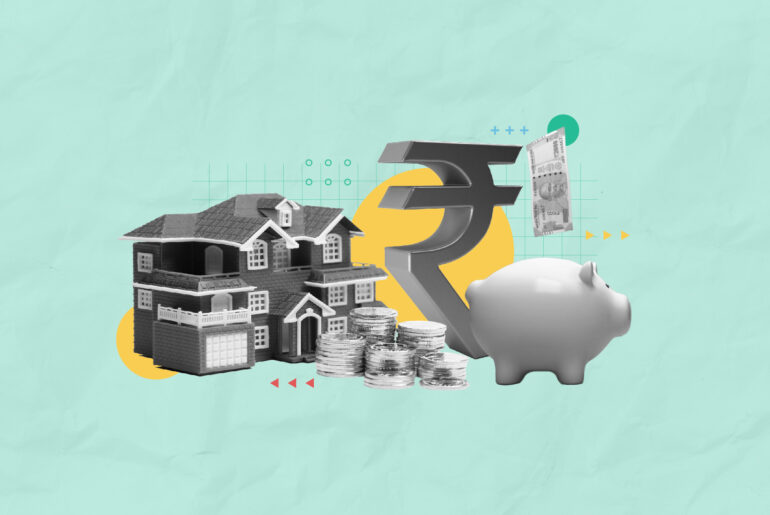Your CIBIL Score acts as your first impression when you are applying for a loan. Well, there’s a good CIBIL score that fastens your process for getting a loan, and there’s a bad score which can be a hurdle. Hence, understanding the significance of your CIBIL score empowers you to navigate the loan process easily. In this article, let’s delve into the importance of the CIBIL score for home loan applications, how it impacts eligibility, and essential tips to improve your score.
Table of Contents
What is CIBIL Score?
The CIBIL Score is a credit score offered by the Credit Bureau TransUnion CIBIL, one of India’s four authorised credit bureaus, along with Equifax, Experian, and High Mark. Established in 2000, the Credit Information Bureau Limited (CIBIL) is a credit information company that maintains credit records of individuals and organisations.
A credit score is a three-digit numeric summary of your entire credit history, ranging from 300 to 900. It is based on your credit history, including all loans and other debts you may have or had. You can obtain your credit score and credit report from CIBIL for a nominal fee. The credit report will include details about your credit availed, loan and credit card repayment history, late payments, defaults, current loans and credit cards, and recent loan and credit card applications.
Different ranges of credit scores
Whether from CIBIL or another issuing body, most credit scores range between 300 and 900. Below are the general presumed credit score ranges and their corresponding implications:
| Credit Score Range | Category |
| <300 | No Score |
| 300-550 | Very Low Credit Score |
| 551-620 | Low Credit Score |
| 621-700 | Fair Credit Score |
| 701-749 | Good Credit Score |
| 750+ | Excellent Credit Score |
Now, let’s look at the various credit score ranges and their implications for home loans:
- 750 and above: It signifies an ideal credit standing for a home loan, granting easy loan approval and negotiating power. Borrowers with such scores can access competitive interest rates and ample housing finance options.
- 650 to 749: Falling within the range is considered a good credit score, prompting lenders to assess additional financial details before offering a home loan. However, most lenders generally require a minimum CIBIL score of 650 for loan approval.
- 550 to 649: Credit scores in this range are considered average and may require improvement to enhance loan prospects.
- Scores falling between 300 and 549 are categorised as bad credit scores.
- For individuals with no credit history, the status is denoted by NH or NA, indicating the absence of credit information.
Does CIBIL Score Affect Home Loan Eligibility?
Lenders, such as banks and financial institutions, rely on credit scores to assess your creditworthiness. A credit score, a three-digit number ranging from 300 to 900, represents our overall financial health based on the information in our Credit Information Report (CIR).
The score plays a crucial role in evaluating home loan applications, as it reflects your creditworthiness and financial position. A higher credit score increases the likelihood of easy home loan approval, while a lower score may make the process more challenging. However, other factors like CIR, income, and existing loan obligations also influence the lender’s decision. Different banks may have varying credit policies, leading to different outcomes, such as a higher interest rate for those with lower credit scores.
Minimum CIBIL Score for Home Loan
The minimum CIBIL score required for a home loan in India differs from one lender to another. For instance, one lender might agree to provide you with a home loan with a credit score of 650, while another may need a score higher than 700. Hence, having a higher CIBIL score secures your chances of getting a home loan.
Can a good CIBIL score help you get a home loan at a lower EMI? –
As mentioned, a higher CIBIL score can increase your chances of getting a home loan easily. But does it also impact your EMI for the loan? Let’s find out.
In simple terms, having a good CIBIL score while applying for a home loan makes you eligible and can get you funding at lower interest rates. As a result, you will have lower EMIs, which will help bring down the overall cost of your loan.
A home loan is considered a long-term debt that may run on for decades. Hence, a small reduction in interest rates can potentially save you a lot of money. Therefore, maintaining a higher CIBIL score can help you immensely while you are applying for a home loan.
How to improve your CIBIL score for a home loan?
In case you are looking for a home loan but are faced with a bad credit score, then there are various ways to improve it. As it is crucial to have a higher credit score for availing of a home loan, you must focus on the below-mentioned ways to boost your CIBIL score.
Make timely payments
Paying your bills and EMIs on time is crucial for improving your CIBIL score. Set up reminders or use autopay options to ensure timely payments. Avoid partial payments, as they can be recorded as overdue in your credit report.
Manage credit utilisation
Keep your credit utilisation low by not maxing out your credit cards. It is considered better to keep your credit card balances below 30% of the credit limit. High credit utilisation can negatively impact your credit score.
Monitor joint accounts
If you have joint accounts, ensure all payments are made on time. Any missed payments by you or the joint account holder can affect your credit score.
Maintain a balanced credit mix
Having a balanced mix of secured and unsecured loans can positively impact your credit score. A diverse credit portfolio shows responsible credit management, including credit cards, personal loans, and home loans.
Pay off existing loans and credit card debts
Clearing off existing loans and credit card debts on time demonstrates financial discipline. Aiming to pay the entire outstanding balance and not just the minimum due to improving your credit score is ideal.
Avoid closing old accounts
Maintain old, unused credit accounts, as they contribute to a longer credit history. A longer credit history can positively impact your credit score.
Minimise applying for new credits
Avoid frequent applications for new credit cards or loans. Multiple hard inquiries can lower your credit score. Apply for new credits only when necessary to maintain a healthy credit profile.
Following these steps and practising responsible credit management can gradually improve your CIBIL score. A higher credit score will enhance your chances of getting a home loan with favourable terms and conditions, including lower interest rates and higher loan amounts.
Conclusion
Understanding the importance of your CIBIL score for a home loan is essential for aspiring homeowners. Your CIBIL score acts as a crucial indicator of your creditworthiness and financial responsibility, directly influencing your eligibility for a home loan. By keeping your credit history in check, timely paying bills, and reducing outstanding debts, you can improve your CIBIL score over time. This proactive approach increases your chances of securing a favourable home loan and sets the stage for a more stable and prosperous financial future. Remember that a strong CIBIL score is the key that unlocks the door to your dream home.
FAQs
Does CIBIL Score Affect Home Loan Eligibility?
Lenders, such as banks and financial institutions, rely on credit scores to assess your creditworthiness. A higher credit score increases the likelihood of easy home loan approval, while a lower score may make the process more challenging. However, other factors like CIR, income, and existing loan obligations also influence the lender’s decision.
How to check CIBIL score online?
To access your CIBIL score online, visit the official website of CIBIL. There, you will find an application form which you will have to fill out with your identifying information. Once done, submit your application by paying the required amount of Rs. 470.
Post payment, you will be directed to the authentication page, where you will have to answer some questions about your loans and credit cards to confirm your identification. Once your authentication is done, CIBIL will send your score through e-mail within 24 hours.
Can I get a home loan with a low CIBIL Score?
Yes, it is possible to get a home loan with a low CIBIL score. However, it is important to know that when you opt for a home loan with a low CIBIL score, it may result in a higher interest rate on the loan. Moreover, it usually depends on the lender as to what they consider a minimum range of credit score to provide loans.
How to avail home loan without CIBIL Score?
Though showing your creditworthiness is one of the crucial factors for a home loan, many lenders also provide home loans to new-to-credit applicants. They look for additional factors like EMI/NMI ratio, job stability, employer category, etc.
What is the maximum amount approved while applying for a home loan?
The maximum amount offered by lenders for a home loan is usually up to 80-85% of the property’s value. The loan amount you will receive will depend on various factors like your citizenship status, type of home loan (renovation, property purchase, property extension), and the lender’s policies.
Are there any tax benefits on a home loan?
Yes, home loan borrowers can avail tax benefits on both the principal and interest amount under Section 80C and Section 24 of the Income Tax Act, respectively. However, before planning and opting for a loan, it is worthwhile to consult with your tax advisor to understand these tax benefits better.
- Best Mutual Funds for Passive Investors (2025) - Dec 9, 2024
- List of Stocks With RSI Below 30 in India - Dec 9, 2024
- 10 Highest Dividend Paying Stocks in Nifty 50 NSE India - Dec 9, 2024




